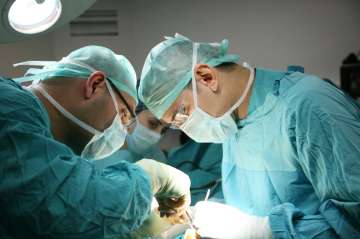Houston: In a first-of-its-kind procedure, doctors in the US have successfully transplanted a "composite" skull and scalp flap, along with kidney and pancreas - all from the same donor - in a 55-year-old patient.
The patient was suffering from a non-healing scalp defect and declining organ kidney and pancreas function, researchers said. "Hopefully, this case and others like it will help to widen the narrow indications for this fascinating new field of reconstructive surgery," said Jesse Creed Selber of The University of Texas MD Anderson Cancer Centre and colleagues.
The experience may open the way to further procedures combining "vascularised composite allotransplantation" (VCA) with organ transplants, in patients who have already accepted the need for lifelong immunosuppressive therapy.
VCA refers to transplant procedures combining different types of tissues, such as skin, muscle, blood vessels, nerves, and bone. Face transplantation is the best-known type of VCA; hand transplantation is another example.
However, they also have a major drawback - the need for immunosuppressive drugs to prevent the recipient's immune system from rejecting the transplant. Patients who also need or have already undergone organ transplantation have already accepted the risks of lifelong immunosuppressive therapy.
Two decades earlier, the 55-year-old patient had undergone kidney transplantation for diabetic kidney disease, but that kidney was now failing.
He also had a large, unstable wound of the scalp and skull - a complication of surgery and radiation therapy for a scalp tumour. An increased risk of cancers is one of the risks of long-term immunosuppressive treatment.
Since the patient was already receiving immunosuppressive therapy and would need another organ transplant in any case, doctors suggested a procedure in which a VCA of scalp and skull would be performed at the same time as a kidney/pancreas transplant, with all transplants coming from the same donor.
After 18 months, a suitable donor became available - providing not only basic immunologic compatibility but also a match in terms of skin colour and quality, hair pattern and head size.
The combined VCA and double-organ transplant procedure required 20 physicians and 15 hours in the operating room. At the end of the procedure, both transplants were receiving good blood supply and the transplanted organs were functioning normally.
An episode of rejection of the scalp/skull transplant occurred after a few months, but was successfully treated. One year after the procedure, the patient was doing well, including good cosmetic appearance of the transplanted scalp.
The fact that both the composite transplant and organs were from the same donor minimised the risk of rejecting tissues stimulated by a second donor's tissue. The research was published in the journal of Plastic and Reconstructive Surgery.
Latest World News
